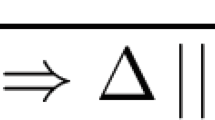Abstract
We present the paradigm of categories-as-syntax. We briefly recall the even stronger paradigm categories-as-machine-language which led from λ-calculus to categorical combinators viewed as basic instructions of the Categorical Abstract Machine. We extend the categorical combinators so as to describe the proof theory of first order logic and higher order logic. We do not prove new results: the use of indexed categories and the description of quantifiers as adjoints goes back to Lawvere and has been developed in detail in works of R. Seely. We rather propose a syntactic, equational presentation of those ideas. We sketch the (quasi-equational) categorical structures for dependent types, following ideas of J. Cartmell (contextual categories). All these theories of categorical combinators, together with the translations from λ-calculi into them, are introduced smoothly, thanks to the systematic use of
-
- an abstract variable-free notation for λ-calculus, going back to N. De Bruijn,
-
- a sequent formulation of the natural deduction.
Similar content being viewed by others
References
N. De Bruijn, Lambda-calculus notation with nameless Dummies, a tool for automatic formula manipulation, Indag. Math. 34 (1972).
K. Bruce and G. Longo, A modest model of records, inheritance and bounded quantification, Proc. LICS 88, Edinburgh (1988).
A. Burroni, Algèbres graphiques, Cahiers de Topologie et Géométrie Différentielle XXII-3 (1981).
CAML Primer and CAML Reference Manual, INRIA-ENS (1988).
L. Cardelli, The Amber machine, in Combinators and Functional Programming, LNCS 242 (1986).
J. Cartmell, Generalized algebraic theories and contextual categories, Thesis, Oxford (1978).
T. Coquand, Metamathematical investigations of a calculus of constructions, Technical Report, Cambridge University (1987).
T. Coquand, Sur l'analogie entre les propositions et les types, in cf. [5].
T. Coquand and T. Ehrhard, An equational presentation of higher order Logic, Proc. Second Summer Conference on Category Theory and Computer Science, Edinburgh LNCS283 (1987).
T. Coquand, C. Gunter and G. Winskel, Domain theoretic models of polymorphism, Technical Report 116, Cambridge University (1987).
G. Cousineau, P.-L. Curien and M. Mauny, The categorical abstract machine, Science of Computer Programming 8 (1987), pp. 173–202.
G. Cousineau, P.-L. Curien, M. Mauny and A. Suarez, Combinateurs catégoriques et implémentation des langages fonctionnels, in cf. [5].
P.-L. Curien, Categorical combinators, Information and Control 69 (1–3) (1986), pp. 188–254.
P.-L. Curien, Categorical Combinators, Sequential Algorithms and Functional Programming, Pitman (1986).
P.-L. Curien and T. Ehrhard, Categories for dependent types, unpublished manuscript.
T. Ehrhard, A categorical semantics of constructions, Proc. LICS 88, Edinburgh (1988).
T. Ehrhard, Catégories et types variables, Thesis, in preparation.
J.-Y. Girard, Interprétation fonctionnelle et elimination des coupures de l'arithmétique d'ordre supérieur, Thèse de Doctorat d'Etat, Université Paris VII (1972).
J.-Y. Girard, Proof Theory and Logical Complexity, Bibliopolis (1987).
J.-Y. Girard, The system F of variable types, fifteen years later, Theoretical Computer Science (1986).
T. Hardin and A. Laville, Proof of termination of the rewriting system SUBST on CCL, Theoretical Computer Science 46 (1986).
T. Hardin, Résultats de confluence pour les règles fortes de la logique combinatoire catégorique et liens avec les lambda-calculs, Thèse de Doctorat, Université Paris VII (Oct. 1987).
M. Hyland and A. Pitts, The theory of constructions: categorical semantics and topos-theoretic models, Proc. Conf. on Categories in Computer Science and Logic, to appear as Contemporary Mathematics volume, Boulder (1987).
J.-W. Klop and R. de Vrijer, Unique normal forms for lambda-calculus with surjective pairing, ITLI Technical Report, University of Amsterdam (1987).
Y. Lafont, Logiques, catégories et machines: implantation de langages de programmation guidée par la logique catégorique, Thèse de Doctorat, Université Paris VII (Jan. 1988).
F. Lamarche, A simple model of the theory of constructions, in J. Gray and A. Scedrov (eds.), Categories in Computer Science and Logic, Contemporary Mathematics, to appear.
P. J. Landin, The mechanical evaluation of expressions, Computer Journal 6 (1964).
W. Lawvere, Adjointness in foundations, Dialectica 23 (3/4) (1969).
W. Lawvere, Equality in hyperdoctrines and the comprehension schema as an adjoint functor, in Proc. New York Symposium on Applications of Categorical Logic, A. Heller (ed.), Amer. Math. Scoc. (1970).
G. Longo and E. Moggi, Constructive natural deduction and its modest interpretation, in Semantics of Natural and Programming Languages, J. Meseguer (ed.), M.I.T. Press, to appear (1988).
S. Mac Lane, Categories for the Working Mathematician, Springer (1971).
P. Martin-Löf, Intuitionistic Type Theory, Bibliopolis (1984).
A. Obtułowicz, Categorical and algebraic aspects of Martin-Löf type theory, this volume.
A. Pitts, Polymorphism is set theoretic, constructively, cf. [9].
R. Seely, Hyperdoctrines, natural deduction and the Beck condition, Zeitschrift für Math. Logic und Grundlagen der Math. 29 (1983).
R. Seely, Locally cartesian closed categories and type theory, Mathematical Proceedings of Cambridge Philosophical Society 95 (1984).
R. Seely, Categorical semantics for higher order polymorphic lambda-calculus, Journal of Symbolic Logic 52 (1987), pp. 969–989.
T. Streicher, Correctness and completeness of a semantics of the calculus of constructions with respect to interpretation in doctrines of constructions, Thesis, Universität Passau (1988).
P. Taylor, Recursive domains, indexed category theory and polymorphism, PhD Thesis, University of Cambridge (1986).
Author information
Authors and Affiliations
Rights and permissions
About this article
Cite this article
Curien, PL. Alpha-conversion, conditions on variables and categorical logic. Stud Logica 48, 319–360 (1989). https://doi.org/10.1007/BF00370828
Received:
Revised:
Issue Date:
DOI: https://doi.org/10.1007/BF00370828



